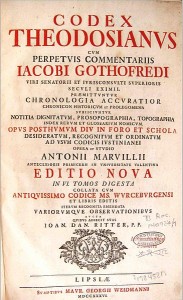 C. Th. XV.xii.1- Bloody spectacles are not suitable for civil ease and domestic quiet. Wherefore since we have proscribed gladiators, those who have been accustomed to be sentenced to such work as punishment for their crimes, you should cause to serve in the mines, so that they may be punished without shedding their blood. Constantine Augustus.
C. Th. XV.xii.1- Bloody spectacles are not suitable for civil ease and domestic quiet. Wherefore since we have proscribed gladiators, those who have been accustomed to be sentenced to such work as punishment for their crimes, you should cause to serve in the mines, so that they may be punished without shedding their blood. Constantine Augustus.
C. Th. XVI.v.1- It is necessary that the privileges which are bestowed for the cultivation of religion should be given only to followers of the Catholic faith. We desire that heretics and schismatics be not only kept from these privileges, but be subjected to various fines. Constantine Augustus.
C. Th. XVI.x.4- It is decreed that in all places and all cities the temples should be closed at once, and after a general warning, the opportunity of sinning be taken from the wicked. We decree also that we shall cease from making sacrifices. And if anyone has committed such a crime, let him be stricken with the avenging sword. And we decree that the property of the one executed shall be claimed by the city, and that rulers of the provinces be punished in the same way, if they neglect to punish such crimes. Constantine and Constans Augusti.
C. Th. XVI.vii.1- The ability and right of making wills shall be taken from those who turn from Christians to pagans, and the testament of such an one, if he made any, shall be abrogated after his death. Gratian, Valentinian, and Valens Augusti.
C.Th. XI.vii.13- Let the course of all law suits and all business cease on Sunday, which our fathers have rightly called the Lord’s day, and let no one try to collect either a public or a private debt; and let there be no hearing of disputes by any judges either those required to serve by law or those voluntarily chosen by disputants. And he is to be held not only infamous but sacrilegious who has turned away from the service and observance of holy religion on that day. Gratian, Valentinian and Theodosius Augusti.
C.Th. XV.v.1- On the Lord’s day, which is the first day of the week, on Christmas, and on the days of Epiphany, Easter, and Pentecost, inasmuch as then the [white] garments [of Christians] symbolizing the light of heavenly cleansing bear witness to the new light of holy baptism, at the time also of the suffering of the apostles, the example for all Christians, the pleasures of the theaters and games are to be kept from the people in all cities, and all the thoughts of Christians and believers are to be occupied with the worship of God. And if any are kept from that worship through the madness of Jewish impiety or the error and insanity of foolish paganism, let them know that there is one time for prayer and another for pleasure. And lest anyone should think he is compelled by the honor due to our person, as if by the greater necessity of his imperial office, or that unless he attempted to hold the games in contempt of the religious prohibition, he might offend our serenity in showing less than the usual devotion toward us; let no one doubt that our clemency is revered in the highest degree by humankind when the worship of the whole world is paid to the might and goodness of God. Theodosius Augustus and Caesar Valentinian.
C. Th.XVI.i.2- We desire that all the people under the rule of our clemency should live by that religion which divine Peter the apostle is said to have given to the Romans, and which it is evident that Pope Damasus and Peter, bishop of Alexandria, a man of apostolic sanctity, followed; that is that we should believe in the one deity of Father, Son, and Holy Spirit with equal majesty and in the Holy Trinity according to the apostolic teaching and the authority of the gospel. Gratian, Valentinian and Theodosius Augusti.
C. Th. XVI.v.iii- Whenever there is found a meeting of a mob of Manichaeans, let the leaders be punished with a heavy fine and let those who attended be known as infamous and dishonored, and be shut out from association with men, and let the house and the dwellings where the profane doctrine was taught be seized by the officers of the city. Valentinian and Valens Augusti.
Oliver J. Thatcher, ed., The Library of Original Sources (Milwaukee- University Research Extension Co., 1907), Vol. IV- The Early Medieval World, pp. 69-71.